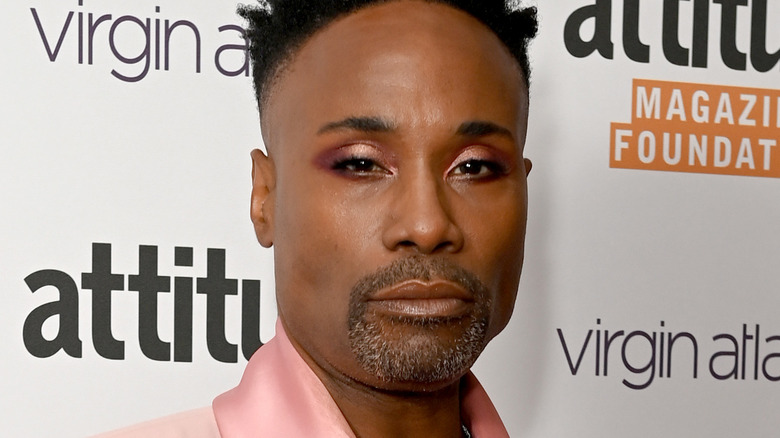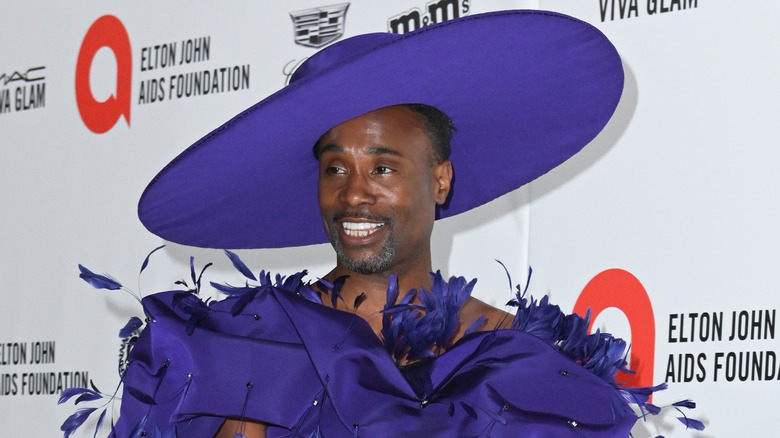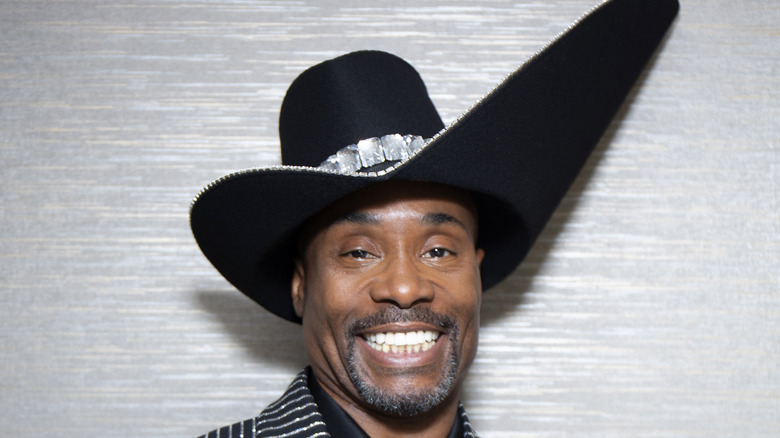Inside Billy Porter's Journey With Body Dysmorphia
We may receive a commission on purchases made from links.
This article contains mention of sexual assault.
Billy Porter has become a force to be reckoned with in the entertainment industry — with a persona that makes him seem larger than life. In reality, Porter navigated numerous difficulties earlier on that, at times, were massive challenges to overcome. One of his issues, which is connected to other tough life experiences, has been his body dysmorphia.
As People detailed, Porter grew up in Pittsburgh, Pennsylvania. He was named after his biological father, but never really knew him. His mother was disabled, and the family belonged to a conservative Pentecostal church. He started singing in church at a young age, but his bold style and personality made him a frequent target for bullying. Porter knew at a very young age that he was LGTBQ+, yet, as he told People, "My Black queerness made everyone uncomfortable." He ended up hospitalized as a first-grader after being beaten up in school.
Porter was seven years old when his mom married his stepfather, and the dynamic took a heartbreaking turn soon after the marriage. Porter alleged his stepfather sexually abused him weekly for about five years. The experience left him confused, as it provided "an illusion of care, of a big, strong man caring for me." Porter noted he remained impacted by the abuse throughout his adulthood. He embraced musical theater during his teen years, admitting "I don't think I'd be alive if I hadn't discovered it."
Billy Porter has dealt with body dysmorphia for years
During an interview with "Good Morning America" on October 21, Billy Porter looked back on some childhood photos. "You know, he's a brave little boy and he was going through some stuff that he couldn't talk about at that time," Porter said in an accompanying video that saw him looking over multiple pictures. It wasn't until he worked on his memoir, "Unprotected," and threw himself into his healing that he was able to look back.
Porter noted those childhood years were filled with "incessant bullying" and "disenfranchisement from my religious community" along with his stepfather's sexual abuse. One photo featured by GMA was, as Porter described, "skinny Billy," showing Porter at around 16 years of age. "I think I low key, had some sort of eating disorder, you know, and some sort of body dysmorphia that I still sort of carry to this day," he shared as he looked at that snapshot.
Despite all the successes Porter has achieved, "I still will look at myself in the mirror and think that I'm overweight," the actor admitted. "That I'm in some way unattractive." Even with his dysmorphia, Porter was determined to rise above. "They told me that I was too Black, too much, too gay, all of these things. I always knew that I had gifts that transcended what anybody thought about me," he detailed. "I knew I had gifts that could transcend that dismissal."
The actor wants to tell a story of healing
Billy Porter opened up in "Unprotected" about forging forward (via The Washington Post). "It's time to leave my past behind. My trauma has been my engine for my entire life, and I don't want to be defined by my past anymore," he detailed. "It's time to tell a different story. A story of healing."
Porter credits "Pose" creator Ryan Murphy for help confronting his dysmorphia. He told The Playlist he'd "never been more nervous in my life" while filming his first love scene. Porter recalled believing, "Who wants to look at me? That's not my skillset. I'm not the sex symbol. That's the messaging I've always had in my life." He noted Murphy "leans into sexuality for everybody," and that "really freed me in a lot of ways of my body dysmorphia insecurity if you will."
As Entertainment Tonight noted, Porter became the first openly gay Black man to receive an Emmy for Outstanding Lead Actor in a Drama thanks to "Pose." Since then, he came out as HIV-positive and "started real trauma therapy," he told The Hollywood Reporter. "There has never been a moment that I've not been in trauma," Porter explained, adding "it was my engine for a very long time." Now, as he told People, "I'm looking for legacy that lasts beyond my ego, beyond my faith, beyond my money."
If you or someone you know may be the victim of child abuse, please contact the Childhelp National Child Abuse Hotline at 1-800-4-A-Child (1-800-422-4453) or contact their live chat services.



